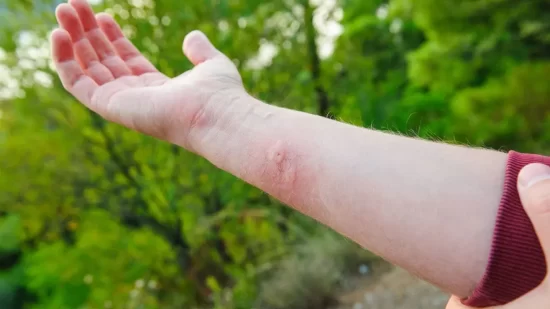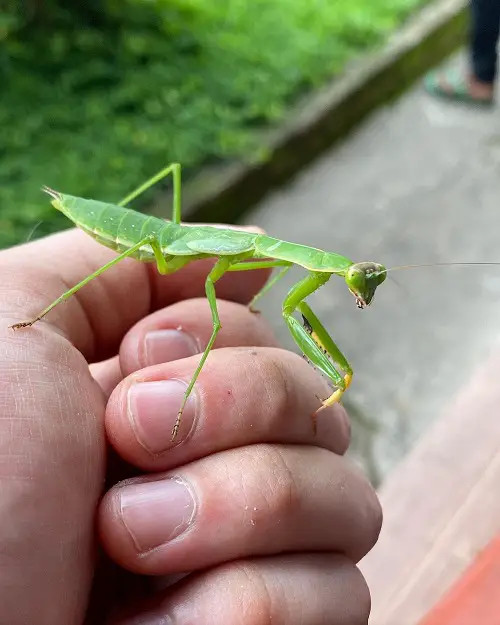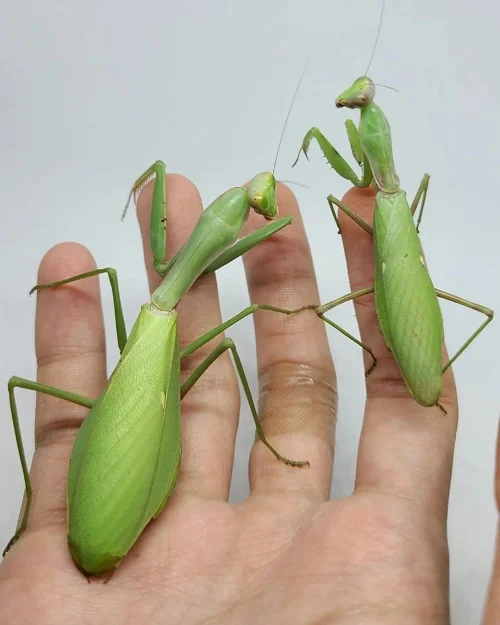Do Praying Mantis Bite? Is it always safe around to play with them? This article will answer all your queries in detail!
Do Praying Mantis Bite – this question often occupies the minds of gardeners and nature enthusiasts. If you, too, are one of them, keep reading to clear all your doubts!
Are praying mantis good luck? Find out here
Some Facts About Praying Mantis
Praying mantises have a unique body shape. Their front legs are long and bent, resembling folded hands, which is how they get their name, “praying mantis.” These insects can remain incredibly still for extended periods, often blending into their surroundings.
Most mantises are carnivores and excellent hunters, primarily feeding on various insects, which helps naturally control insect pests.
Praying Mantis Facts + What Do Praying Mantis Eat
Do Praying Mantis Bite?

Yes, praying mantises are capable of biting. They possess sharp mandibles primarily designed for hunting and feeding. However, they may resort to biting defensively when they feel threatened or provoked.
Defensive Mechanisms
Mantises employ various defensive mechanisms, including camouflage and staying still to blend with their surroundings. Biting is a last-resort defensive response.
Biting Behavior
Mantises tend to bite when provoked, rough-handled, or faced with sudden and aggressive movements to deter potential threats.
Factors Provoking a Mantis Bite
Certain actions, such as sudden movements or attempting to manipulate the insect forcefully, increases the likelihood of a mantis bite.
Mantis Species Variability in Biting Tendencies
Different mantis species may have differences when it comes to biting, influenced by individual temperament and environmental conditions.
Do Bearded Dragons Bite?
What to Do if a Praying Mantis Bites You

- Immediate First Aid Steps: Keep the wound in running water and clean it with a soap solution. Apply antibiotic ointment and cover it with a clean bandage.
- Recognizing Signs of Infection: Keep an eye on redness, swelling, or increased pain at the bite site.
- Seek Medical Attention: Especially in the case of an allergic reaction or signs of infection.
- Managing Allergic Reactions: Look for allergic reactions and use antihistamines or epinephrine for severe cases.
Unique DIY Snake Plant Stand Ideas
Praying Mantis Bite Comparison with Other Insects

Mantis Bites vs. Bee Stings
- Pain Level: Mantis bites typically result in mild discomfort like a pinprick. In contrast, bee stings often cause sharp and intense pain due to venom injection.
- Allergic Reactions: Bee stings are more likely to induce severe, life-threatening allergic responses as compared to the biting by a mantis.
Mantis Bites vs. Wasp Stings
- Pain Level: Wasp stings are known for causing excruciating pain. Mantis bites, while uncomfortable, are generally less painful.
- Venom Composition: Wasps inject venom, which can trigger severe allergic reactions and, in some cases, require immediate medical attention. Mantises do not deliver venom through their bites.
Mantis Bites vs. Ant Bites
- Pain Level: Ant bites can vary in intensity but are typically less painful than both mantis bites and bee stings.
- Potential for Infection: Ant bites can lead to local infection, like mantis bites, if not properly treated. However, the risk of infection from ant bites is generally lower.



